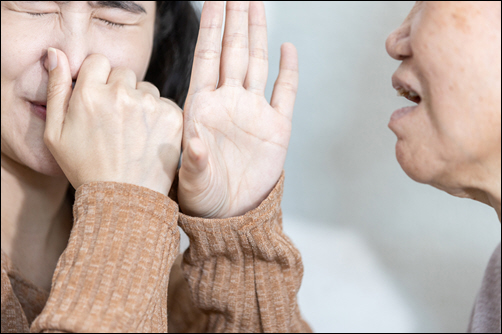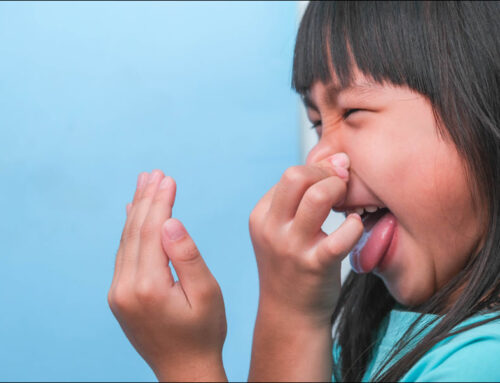Mouth breathing may seem harmless, but it can have a serious impact on your oral health. While it occasional is normal, chronic mouth breathing—especially when sleeping—dries out your mouth and creates an environment that encourages bacterial growth. Here’s why it is detrimental to oral health and what you can do to protect your smile.
How It Affects Oral Health
 When you breathe through your mouth instead of your nose, it disrupts the natural balance of moisture in your mouth. Saliva is essential for washing away food particles and bacteria, neutralizing acids, and maintaining a healthy pH balance. Chronic mouth breathing dries up saliva, leading to a condition known as dry mouth. Without enough saliva to protect your teeth and gums, you become more vulnerable to various oral health issues.
When you breathe through your mouth instead of your nose, it disrupts the natural balance of moisture in your mouth. Saliva is essential for washing away food particles and bacteria, neutralizing acids, and maintaining a healthy pH balance. Chronic mouth breathing dries up saliva, leading to a condition known as dry mouth. Without enough saliva to protect your teeth and gums, you become more vulnerable to various oral health issues.
Increased Risk of Cavities
Saliva plays a crucial role in protecting your teeth from decay by washing away sugars and bacteria. When mouth breathing reduces saliva, bacteria stick to teeth more easily, increasing plaque buildup and acid production. The acids from bacterial plaque weaken enamel, leaving teeth prone to decay and cavities. Over time, untreated dry mouth can lead to serious decay that affects both oral health and overall comfort.
Gum Disease and Inflammation
It also dries out the gums, making them more susceptible to inflammation and infection. Bacteria thrive in dry conditions, and with decreased saliva, they can easily accumulate along the gumline. This often leads to gingivitis, the early stage of gum disease, characterized by red, swollen, and bleeding gums. If it continues untreated, it can progress to periodontitis, a severe form of gum disease that damages gum tissue and the underlying bone, potentially leading to tooth loss.
Bad Breath
 Dry mouth caused by mouth breathing also leads to bad breath. Without enough saliva to wash away bacteria, odorous compounds accumulate, causing halitosis. This isn’t just a minor inconvenience—it can affect social interactions and self-confidence. Treating the root cause can help you keep your breath fresh and avoid the discomfort associated with chronic bad breath.
Dry mouth caused by mouth breathing also leads to bad breath. Without enough saliva to wash away bacteria, odorous compounds accumulate, causing halitosis. This isn’t just a minor inconvenience—it can affect social interactions and self-confidence. Treating the root cause can help you keep your breath fresh and avoid the discomfort associated with chronic bad breath.
Effects on Tooth Alignment and Jaw Development
For children, chronic mouth breathing can impact the development of their jaw and facial structure. Children who consistently breathe through their mouths often experience narrow arches, an elongated face, or misaligned teeth, which may require orthodontic treatment. Addressing the problem early in children can prevent these long-term issues and support proper jaw growth.
Prevention and Treatment
To prevent the harmful effects of mouth breathing, it’s essential to identify and treat the underlying causes. Here are some ways to address it:
- See a Doctor or Dentist: If you suspect chronic mouth breathing, consult a healthcare professional to identify the cause. Allergies, nasal congestion, or a deviated septum often lead to the condition, so treating these conditions can help restore nasal breathing.
- Stay Hydrated: Drink water throughout the day to keep your mouth moist and stimulate saliva production. Consider using a humidifier at night to add moisture to the air, helping prevent dry mouth while you sleep.
- Practice Breathing Exercises: Practicing breathing exercises or using nasal strips can encourage nasal breathing and help break the habit.
- Use Saliva Substitutes: Over-the-counter saliva substitutes or rinses designed for dry mouth can provide temporary relief and help protect teeth and gums from dryness.
Protecting Your Oral Health
Mouth breathing has serious consequences for your oral health, from increasing decay risk to affecting gum health and overall comfort. By addressing mouth breathing early and finding solutions, you can protect your smile, avoid complications, and improve your overall health. Take action today to restore healthy breathing habits and support a healthier mouth.



